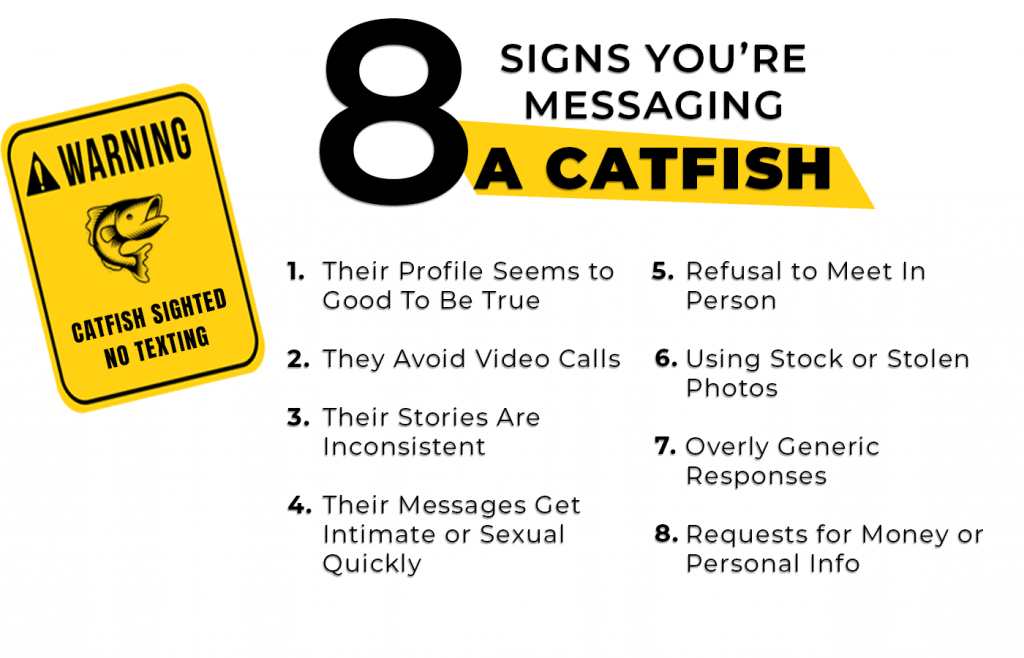Catfishing has become the go-to tactic for cybercriminals, luring victims into their web of deception with alarming effectiveness. Almost every application that allows you to interact with others online lets you change aspects of your identity through beauty filters, face swaps, and voice manipulation.
This technology has created a whole new world where it is harder to detect which profiles are real and fake, making it that much easier for scammers to swindle their victims. Why do they do it? By crafting the façade of the ideal partner, scammers lure their victims into factitious relationships that can enable cyber extortion and other cybercrimes.
Many people may not fully understand the extent of these fallacious tactics and could already be interacting with multiple fake profiles, but what is the real danger? Keep reading to learn more about catfishing scams.
Why Is It Called Catfishing?
The term catfish was originally coined in a 2010 documentary film appropriately titled ‘Catfish’(1), which followed a young man named Nev Schulman and his fraudulent relationship with a woman he met on Facebook. Building on the film’s popularity, MTV launched a series in 2012(2) that exposed online scammers on a weekly basis.
But why the Catfish? The name originates from a quote by Schulman explaining that catfish were historically used to keep cod active during transport on commercial fishing vessels. While the connection seems non-sensical, the term carries intriguing metaphorical parallels.
A stronger link might come from the practice of hand-fishing, or “noodling,” where fishermen attract catfish by leading them to believe their fingers are worms and making a fist to hook the fish once they bite. Regardless of the logic behind the naming, “catfishing” has become firmly embedded in public consciousness as the term for cases of online deception and fraud.

Is Catfishing Illegal?
Yes, catfishing scams are considered illegal depending on the circumstances and motivation. In most countries, the use of someone else’s information is enough to be considered fraud. But the cases in which these perpetrators are most commonly prosecuted are some form of extortion. Of these crimes, sextortion, blackmail, and extortion via romance scams are the most popular.
Signs That You Are Being Catfished
There are many different approaches to committing a catfishing scam, but there are some common signs to look for that may help you see through their false identity.
- Refusal to Show Themself – If the person you are speaking with refuses to join video or voice calls, has a limited number of photos of themself, and constantly makes excuses to avoid meeting in person, they may be hiding for a reason.
- Their Profile is New – If they have recently created their profile and have a limited following, it may be a sign that they are not who they say they are.
- Love Bombing – This is a common tactic in all romance scams. The perpetrator may flood you with compliments and declare their love for you early into the conversation to emotionally manipulate you.
- Things Don’t Add Up – If they can’t keep the details of their story consistent or the information they are sharing seems too good to be true, you should trust your gut.

How Many People Are Catfished Each Year?
Despite growing awareness around the topic, more people fall victim to catfishing scams than you’d expect. The FTC reported that losses to romance scams eclipsed $1.14 billion in 2023, the highest of any imposter scam(3).
When surveyed, 13% of US adults said they had definitely come in contact with a scammer and an additional 17% said it was a likely occurrence. Combine this with the 40% of adults who knew someone that likely had a catfishing scam experience, and you realize just how prevalent the issue is(4).
Why is Catfishing So Effective?
These schemes exploit individuals who are looking for a connection online. The perpetrators of catfishing scams manipulate the emotions of their targets by conducting extensive research into their victim’s online presence and crafting the identity of their perfect match. To learn how you can avoid giving these scammers information they can use against you, check out our article on oversharing online.
The Connection Between Catfishing and Sextortion
Hiding behind a false identity, the catfishing scammers can entice their victims into sharing explicit photos of themselves through sextortion schemes. This can be done by simply requesting them or utilizing the intimate content they’ve received from another victim. Once they’ve convinced the victim to send this content, they then begin to blackmail them.
Most Popular Catfishing Apps
- Dating Apps – The nature of these apps causes them to be a prime location for catfishing scammers. Over half of dating app users say they have crossed paths with someone trying to scam them(5).
- Social Media – As another advantageous avenue to scam somebody, roughly 23% of social media have fallen victim to these catfishing scams(6).
- OnlyFans – The content published on this site enables cybercriminals to steal and scam both content creators and sextortion victims.
What To Do if You Think You’ve Been Catfished
If you feel like you have been targeted in a catfishing scam, act quickly.
- Use Google’s reverse image search feature to see if the profile pictures are stolen. A reverse image search will let you know if the scammer has stolen photos or used stock imagery to craft their persona.
- Avoid sending money or personal information to someone you haven’t met in person. Even if you are being extorted online, delaying payment can help you stall while you get help.
- Don’t block them immediately. If you’ve disclosed personal information or sent explicit content, there are benefits to keeping the connection with your scammer. Investigators can exploit this connection when using different techniques for geo-location.
Resources for Victims of Catfishing Scams
Being the victim of a catfishing scam can be emotionally and financially devastating. However, there are resources available to help you.
- Report to Authorities – Whether you sent money to a catfishing scammer or are receiving threats of online extortion, seek the help of law enforcement.
- Report to System Administrators – Every social media and dating app has resources for users to report issues on the platform. This may not prevent a blackmailer from posting your content, but it can help have their account removed.
- Work With Our Cybersecurity Team – At Digital Forensics Corp, we assist victims of these scams by identifying the location, identity, and technology used by the blackmailers. Using advanced technologies and digital forensics tools, such as IP tracking and device fingerprinting, we can help track down your perpetrator. For more information or to speak with one of our engineers, contact our Blackmail Helpline.
SOURCES
- Catfish (film) – Wikipedia
- Catfish: The TV Show – Wikipedia
- “Love Stinks” – when a scammer is involved | Federal Trade Commission
- U.S. adults catfishing interaction 2022 | Statista
- Key findings about online dating in the U.S. | Pew Research Center
- Social Media Catfishing: Statistics, Facts and Trends Guide for 2025
DISCLAIMER: THIS POST IS FOR INFORMATIONAL PURPOSES ONLY AND IS NOT TO BE CONSIDERED LEGAL ADVICE ON ANY SUBJECT MATTER. DIGITAL FORENSICS CORP. IS NOT A LAWFIRM AND DOES NOT PROVIDE LEGAL ADVICE OR SERVICES. By viewing posts, the reader understands there is no attorney-client relationship, the post should not be used as a substitute for legal advice from a licensed professional attorney, and readers are urged to consult their own legal counsel on any specific legal questions concerning a specific situation.
The information presented in this article is based on sources that are not readily available to the public and may be subject to restrictions or confidentiality. It is intended for informational purposes only.






